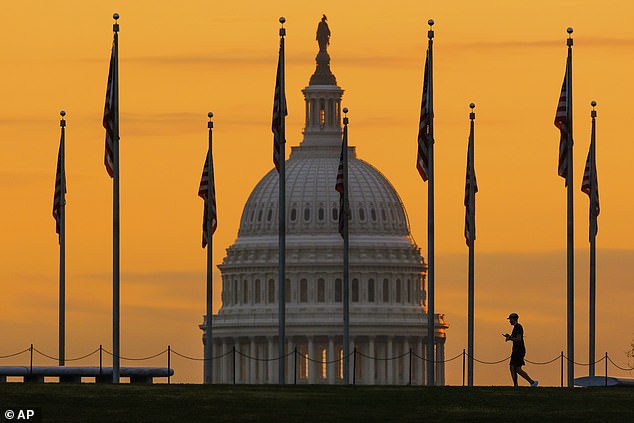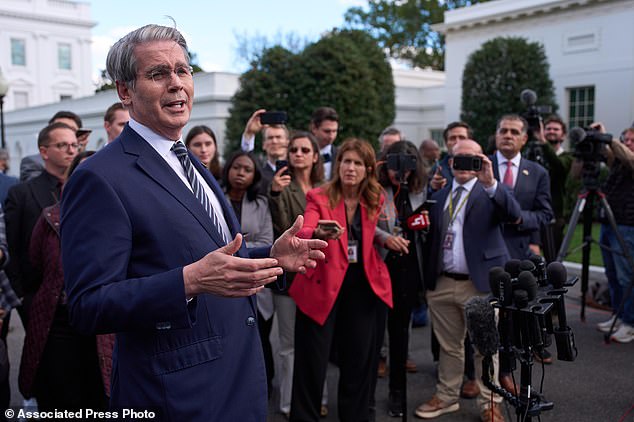The US national debt has surpassed $38 trillion for the first time in history.
The debt reached the grim milestone just two months after surpassing previous forecasts to hit $37 trillion in August.
This was the fastest accumulation of a trillion dollars in debt outside of the emergency government spending during the Covid-19 pandemic.
The booming debt raises concerns about the fiscal health and economic stability of the US, as the government continues to navigate the second-longest federal shutdown in history.
The national debt is the total amount of money the US government has borrowed over time and has not yet repaid.
It is the accumulation of all past budget deficits – which are how much more the government spends than it collects in a single year – plus the interest owed on that borrowing.
The Trump administration said earlier this week that it had reduced the deficit thanks to spending cuts and revenue from tariffs.
New analysis by Treasury Department officials said that from April to September the cumulative deficit totaled $468 billion, which Treasury Secretary Scott Bessent said was the lowest reading since 2019.

The US national debt has surpassed $38 trillion for the first time in history (Pictured: The US Capitol Building in Washington DC)

Treasury Secretary Scott Bessent said that the Trump administration had reduced the deficit
The Trump administration said it had reduced the deficit by $350 billion compared to the same period last year.
The Congressional Budget Office expects tariffs to lower the deficit by $4 trillion over the next decade.
However it also predicts that President Trump’s landmark ‘One Big Beautiful Bill Act’ will add $4.1 trillion to the deficit.
Experts are expressing their concern about what the surging US national debt means for the economy and for American people.
Wall Street veteran Ray Dalio warned on Thursday that the US is ‘heading for a crisis.’
‘The US government is spending $7 trillion a year and taking in $5 trillion a year. So it is spending 40 percent more than it is taking in,’ the billionaire founder of investment management company Bridgewater Associates told NPR.
‘And it is selling into a world that does not really want to buy the amount of debt any more because they have a lot of it, and that is why we are seeing a shift to gold, for example.’
Michael Peterson, chair and CEO of the nonpartisan Peter G. Peterson Foundation, said in a statement that ‘reaching $38 trillion in debt during a government shutdown is the latest troubling sign that lawmakers are not meeting their basic fiscal duties.’

Wall Street veteran Ray Dalio warned on Thursday that the US is ‘heading for a crisis’

The government is currently navigating the second-longest federal shutdown in US history
He continued: ‘Along with increasing debt, you get higher interest costs, which are now the fastest growing part of the budget.
‘We spent $4 trillion on interest over the last decade, but will spend $14 trillion in the next 10 years. Interest costs crowd out important public and private investments in our future, harming the economy for every American.’
Kent Smetters, professor at the University of Pennsylvania’s Wharton School, who served in President George W. Bush’s Treasury Department, told The Associated Press that a growing debt load over time leads ultimately to higher inflation, eroding Americans’ purchasing power.
Rising government debt could mean higher borrowing costs for things like mortgages and cars, lower wages from businesses having less money available to invest, and more expensive goods and services.
Lawmakers will now be under increased pressure to create a plan for long-term fiscal reforms.
Maya MacGuineas, president of the Committee for a Responsible Federal Budget, said: ‘The reality is that we are becoming distressingly numb to our own dysfunction.
‘We fail to pass budgets, we blow past deadlines, we ignore fiscal safeguards, and we haggle over fractions of a budget while leaving the largest drivers untouched.’
She added that Social Security and Medicare, for example, are seven years from having their trust funds depleted.
‘You do not hear anything from our political leaders on how to avoid such a disaster,’ she said.
